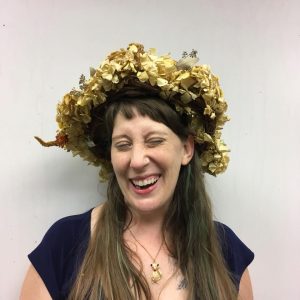
This year’s virtual Push to Publish Conference will include all of the great tips, trends, and connections that writers have gotten from this popular, in-person event—but now from the comfort of your home. Below, we talk with Kelly Andrews, the editor-in-chief of Pretty Owl Poetry. Kelly will be participating in Push to Publish as a speed date editor.
PS: Tell us a bit about your background and what you’re doing now.
KA: I’ve worked in academic publishing for the last 10 years in various roles, including as an Assistant Managing Editor, a freelance copy editor, and a writing coach. I founded Pretty Owl Poetry in 2013 with two other editors who have since left the journal, and in the years since then we’ve grown to a staff of 8. My role for Pretty Owl is that of Editor in Chief and I oversee all aspects of the journal production and staff. In 2016, I received my MFA in poetry from the University of Pittsburgh. I currently work as a consulting editor for a nonpartisan public policy research firm.
PS: How did you get into publishing?
KA: For my undergrad, I studied Journalism, and I was very interested in working for the media as a reporter or editor. I thought this was the most practical way I could use my writing and editing skills. Before college, though, I had been studying poetry with Susanna Fry, a writer who was based in Philly for many years. With her encouragement, I took creative writing classes and really started to identify as a poet. After college, I took the first publishing job I was offered as an editorial assistant for a nonprofit and continued pursuing poetry in my spare time. This led to me pursuing an MFA in poetry from the University of Pittsburgh and starting Pretty Owl Poetry. I love the publishing industry and hope to continue working in it for as long as possible.
PS: What trends are you seeing in the publishing industry?
KA: There seems to be more acknowledgment of the need for diversity, equity, and inclusion in the publishing industry and a lot of journals and presses are taking the right steps to make this happen. We’re constantly evaluating our practices and thinking about the need for change within our own publication and hope this trend continues in others.
PS: How do you think the publishing industry has changed since the pandemic?
KA: The obvious change is the move to online platforms for things like poetry readings and workshops that would traditionally take place in person. I welcome this change as it’s allowed us to have more opportunities to feature writers all over the U.S. in online readings and I’ve had the personal opportunity to take classes with writers who I wouldn’t otherwise.
PS: What do you think writers should avoid when approaching editors or agents?
KA: The quality and fit of a person’s work will be the most important factor when an editor decides to accept or reject your submission. I would avoid trying to sell yourself when approaching an editor. Focus on the quality of the work you’re creating and this will be what leads you to successful publication.
PS: What other advice do you have for writers looking to get published?
KA: Read past issues of a journal before submitting your work. So many journals vary in style in what they accept. You want to make sure your work would fit in with that style before taking the time to prepare and send your submission.